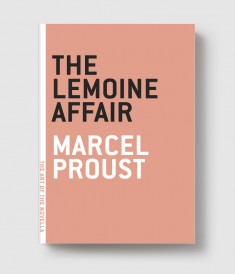
List price: $10.00
- Pages100
- ISBN9781933633411
- Publication dateFebruary, 2008
- Categories
- Booksellers
- Media
- Academics & Librarians
The Lemoine Affair
Marcel ProustAvailable in Ebook only
Translated by Charlotte Mandell
Part of The Art of the Novella
“Their friend Marcel Proust had killed himself after the fall in diamond shares, a collapse that annihilated a part of his fortune.”
The Lemoine Affair was inspired by the real-life French scandal involving Henri Lemoine, who claimed he could manufacture diamonds from coal and convinced numerous people—including officers of the De Beers diamond mine company and Proust himself—to invest in the scheme. In a series of pastiches—imitations written in the style of other writers—Proust tells the story of the embarrassment rippling across high society Paris in the wake of the scandal, poking fun at himself (in one story, a character declares that Marcel Proust is so embarrassed he’s suicidal) while lampooning some of France’s greatest writers, including Flaubert, Balzac, and Saint-Simon.
Full of sophisticated wit and dazzling wordplay, and rife with allusions to his friend and fictional characters, many Proust scholars see the dead-on mimicry of The Lemoine Affair—written soon after Proust’s rejection of society life—as the work by which he honed his own unique, masterly voice.
“It’s hilarious… Times are tough right now, and humor is in short supply. This little Proust, ably translated into English for the first time by Charlotte Mandell, is a good remedy to have on hand.” —The Seattle Times
“The Lemoine Affair is still surprisingly fresh a century after it was written…An enjoyable little oddity.” —The Complete Review
“This is the first-ever translation of this early small work of Marcel Proust. It is an exercise in style and wit and a precursor to his great works. Aside from captivating our readers this year, this book’s virtue is attained by the very wonder of its existence. How can it be that in this age a work of so well-known an author can arrive previously unpublished from a small independent house in Brooklyn to come vividly to life for the first time in an independent bookstore on the upper west side? This is part of ”The Art of the Novella” series from Melville House.” —Books of the Year 2008, Book Culture

















